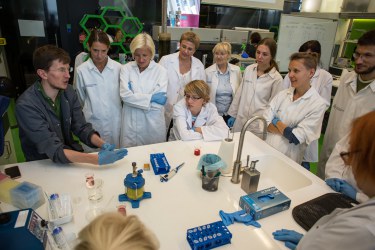Synthetic Biology is still a very vague term from the perspective of the general public. People are usually also not aware of how synthetic biology developments can directly influence their lives. That is why Copernicus Science Centre Biological Laboratory in Warsaw organised 5, free and open to the public, synthetic biology workshops as part of SYNENERGENE Project. The workshops took place during Przemiany Festival entitled “Temptation of Immortality” (1-4 September 2016) and the main aim of the meetings was to popularise the knowledge of synthetic biology among members of the society.
The first workshop entitled simply SYNTHETIC BIOLOGY concerned BioBricks and how they can be used for building complex biological systems. It also focused on how Synthetic Biology influences the development of contemporary medicine and to what degree it can be used in personalised medicine.
The second workshop, BIOLUMINESCENCE, was inspired by works of artists and designers Małgorzata Gurowska and Magdalena Jurek, who create lamps with the use of bioluminescent, ocean-dwelling jellyfish Aequorea victoria, as a source of light. During the workshop participants discovered the role bioluminescence in natural environments, learnt how to isolate the bioluminescent protein from different organisms, and had an opportunity to make their own, natural lamps.
The third workshop, IMMORTAL CELLS, focused on how cells are composed, how they divide and grow old, and how cancer cells are immortal. The participants worked with HeLa cells so they also learned where HeLa come from and about the ethics of certain treatments and therapies performed at the cell level.
ANTIBIOTIC VS. BACTERIA was the title of the forth workshop, which involved multiple drug resistance. Participants discovered how antibiotics combat bacteria, how to utilise drugs properly so that they don’t impact the whole eco-system and which new therapies successfully replace antibiotics.
The last workshop entitled DNA helped people understand how the double helix is built and organised, what it consists of, how it can be used in gene therapy and what other applications of DNA scientists are currently working on.
Head of Copernicus Science Centre Biological Laboratory Stanislaw Loboziak and Elzbieta Turek led all the workshops. The meetings shed light on various aspects of Synthetic Biology and engaged members of the public in this new field of research enabling them to further research. The workshops were also a great opportunity to discuss common anxieties as well as hopes related to new scientific developments.
by Dr Joanna Jeśmian


